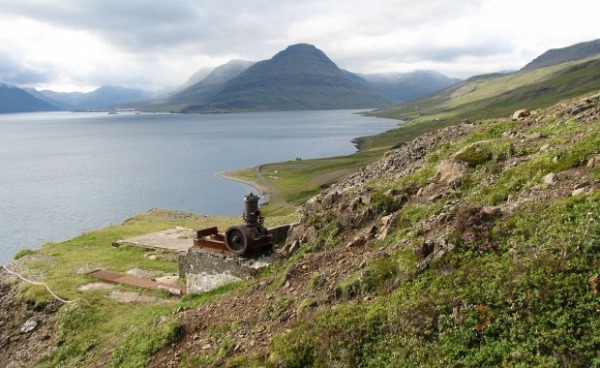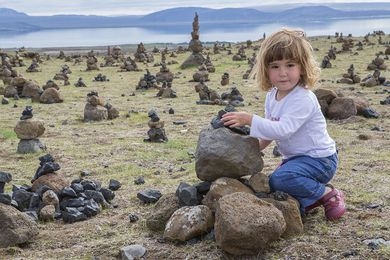Many people like to pick up beautiful or interesting rocks on their travels, keeping them as souvenirs of the landscapes and nature they have visited. But is it ok to bring back rocks from Iceland?

The short answer is that it's always best to leave nature as you found it, for others to enjoy. And you should never try to dig out rocks or mineral formations. That said, there is of course little harm in keeping pebbles you walk across on the beach.
Read more: Family caught stealing zeolite from Teigarhorn nature reserve
The only type of rock which is specifically protected in Iceland are stalactites. Generally stalactites are found hanging from the roof of caves, hot springs, or man-made structures such as mines. Removing or destroying stalactite formations is prohibited by law. All rocks found within nature reserves are also protected.
Rock collectors damage unique spar mine

A historic spar mine in East Iceland, Helgustaðanáma, is an example of a protected nature preserve which has been badly damaged by mineral collectors. Helgustaðanáma is one of most important locations in the world where Iceland spar is found. Iceland spar, known as silfurberg (silver-rock in Icelandic) is a rare form of crystallized calcium carbonate which is only found at a handful of locations world-wide. In addition to Iceland it has only been found at sites in China Mexico and New Mexico.
Read more: Unique spar mine in E. Iceland might have to be closed to visitors due to thefts of crystals
The Environment Agency fears the site could permanently destroyed due to growing tourism, as visitors have chipped away at the rocks to remove nuggets of spar. The mine might have to be closed off entirely to preserve its value.
What about building cairns?

Another practice, which travellers should not engage in, is to pry up boulders and rocks to pile up rocks or cairns. Throughout the centuries Icelanders used cairns to navigate, the carefully built structures providing points of reference when crossing the highlands or heaths. In recent years travellers have been copying these, pulling up rocks of all sizes to build their own cairns.
This behavior is frowned upon for several reasons, not least because pulling up rocks usually leaves open wounds in the vegetation, but also because the cairns never add any value to the landscape. We should all work together to preserve nature as we found it, and respect historic cairns.
Many people like to pick up beautiful or interesting rocks on their travels, keeping them as souvenirs of the landscapes and nature they have visited. But is it ok to bring back rocks from Iceland?

The short answer is that it's always best to leave nature as you found it, for others to enjoy. And you should never try to dig out rocks or mineral formations. That said, there is of course little harm in keeping pebbles you walk across on the beach.
Read more: Family caught stealing zeolite from Teigarhorn nature reserve
The only type of rock which is specifically protected in Iceland are stalactites. Generally stalactites are found hanging from the roof of caves, hot springs, or man-made structures such as mines. Removing or destroying stalactite formations is prohibited by law. All rocks found within nature reserves are also protected.
Rock collectors damage unique spar mine

A historic spar mine in East Iceland, Helgustaðanáma, is an example of a protected nature preserve which has been badly damaged by mineral collectors. Helgustaðanáma is one of most important locations in the world where Iceland spar is found. Iceland spar, known as silfurberg (silver-rock in Icelandic) is a rare form of crystallized calcium carbonate which is only found at a handful of locations world-wide. In addition to Iceland it has only been found at sites in China Mexico and New Mexico.
Read more: Unique spar mine in E. Iceland might have to be closed to visitors due to thefts of crystals
The Environment Agency fears the site could permanently destroyed due to growing tourism, as visitors have chipped away at the rocks to remove nuggets of spar. The mine might have to be closed off entirely to preserve its value.
What about building cairns?

Another practice, which travellers should not engage in, is to pry up boulders and rocks to pile up rocks or cairns. Throughout the centuries Icelanders used cairns to navigate, the carefully built structures providing points of reference when crossing the highlands or heaths. In recent years travellers have been copying these, pulling up rocks of all sizes to build their own cairns.
This behavior is frowned upon for several reasons, not least because pulling up rocks usually leaves open wounds in the vegetation, but also because the cairns never add any value to the landscape. We should all work together to preserve nature as we found it, and respect historic cairns.






